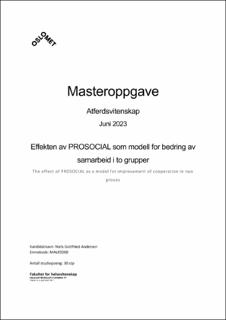| dc.description.abstract | Formålet med denne studien var å undersøke effektiviteten av Prosocial-metodikken som verktøy for endring av samarbeidsdynamikken i grupper. Metodikken er interdisiplinær og forankret i tre vitenskaper; statsvitenskap, evolusjonsvitenskap og kontekstuell atferdsvitenskap. Det er sterk evidens for alle de underordnede vitenskapene, men selve Prosocial metodikken er forholdsvis ny og lite utprøvd. Hensikten var således å teste metodikken i en ny kontekst med to ulike grupper, for om mulig å underbygge antagelsen om at dette er en modell med universelt anvendelsesområde. Intervensjonen bestod i to workshop dager der deltagerne ble presentert for det vitenskapelige grunnlaget, og benyttet ACT matrisen i systematisk arbeid opp mot alle kjerneprinsippene. Gjennom arbeidet med hvert kjerneprinsipp identifiserte deltagerne svakheter i eget samarbeid og formulerte tre kortsiktige handlingsmål som skulle bringe dem nærmere målet om et styrket og mer effektivt samarbeid. For å undersøke effektiviteten på metodikken ble det hentet inn data i forkant av intervensjonen og ved to målepunkter på henholdsvis 30 og 60 dager i etterkant. Resultatene for undersøkelsen indikerer at intervensjonen har god effekt på å øke og effektivisere samarbeidet og skape bedre samhold og trivsel i gruppene. Med tanke på at metodikken er lite utprøvd må denne studien sees på som en feasibility-studie med formål om å bidra til å etablere Prosocial metodikken som en universell metodikk for atferdsendring i grupper.
The purpose of this study was to investigate the effectiveness of the Prosocial methodology as a tool for changing collaborative dynamics in groups. The methodology is interdisciplinary and rooted in three sciences: political science, evolutionary science and contextual behavioral science. There is strong evidence for all the subordinate sciences, but the Prosocial methodology itself is relatively new and little tested. The purpose was thus to test the methodology in a new context with two different groups, in order to support the assumption that this is a model with universal application. The intervention consisted of two workshop days where the participants were presented with the scientific basis and used the ACT matrix in systematic work on all the core principles. Through the work with each core principle, the participants identified weaknesses in their own collaboration and formulated three short-term action goals that would bring them closer to the goal of a stronger and more effective collaboration. To investigate the effectiveness of the methodology, data was collected prior to the intervention and at two measurement points at 30 and 60 days afterwards. The results of the study indicate that the intervention has a good effect on increasing and streamlining collaboration and creating better cohesion and well-being in the groups. Considering that the methodology is little tested, this study must be seen as a feasibility study with the aim of helping to establish Prosocial as a universal methodology for behavioral change in groups. | en_US |
